 [photo: A happy worker is a busy worker. I like The cut of your jib, Kushibo. Let the fools have their tartar sauce.]Lost Nomad links to the annual news that South Korean workers work too long (30 percent more than Americans), trashing their marriages and forcing kids to grow up barely seeing their absentee fathers (and increasingly, absentee mothers). And despite that, productivity still isn't' all that high. Go figure!
[photo: A happy worker is a busy worker. I like The cut of your jib, Kushibo. Let the fools have their tartar sauce.]Lost Nomad links to the annual news that South Korean workers work too long (30 percent more than Americans), trashing their marriages and forcing kids to grow up barely seeing their absentee fathers (and increasingly, absentee mothers). And despite that, productivity still isn't' all that high. Go figure!
Some skeptics of the much-touted "Korean work ethic" (like Daehan Miguk in the Lost Nomad's comments section) rightfully state that "time spent at work in South Korea does not equal productivity." This is especially true in neo-Confucian, top-down hierarchical organizations where people are supposed to stay at work until the boss leaves. Their actual work is probably long finished (or it's not, but they're too mentally exhausted to do any more of it), so the remainder of the time (usually well after 6 p.m. has come and gone) is spent talking with co-workers, surfing the Internet, or talking on the phone with others.
Of course, there are other companies, such as my primary employer, where there really is way too much work for employees, and people are staying until 10 p.m. or midnight, or coming in on Sundays and holidays, because that's the only way to get all the work done.
So you have one type of company where people are supposed to look busy but could probably leave at 5 p.m. and it would make no difference in productivity, and then you have ones where even if they stay until 10 p.m., they're still not getting all their work done. I'm guessing the proportion is somewhere around 50-50. For years, Korean companies have resisted going from a six-day workweek (until a couple years ago, when banks and then government agencies adopted a five-day workweek, virtually all Korean organizations required workers to come in for a half-day, usually finishing around noon or 1 p.m., on Saturday). The primary reason was that they feared productivity would go down (a secondary reason was that Korean employees got too many holidays, including Arbor Day and Constitution Day).Converting to the five-day workweek will be a boost in productivity, not just in per-hour prodctivity, but in overall productivity. Too little gets done in the three or fours of work on Saturday to justify dragging people in. Cutting the workweek some 10% with the elimination of Saturday work schedules would probably mean little or no corresponding drop in how much each employee gets done, thus there is no loss to the companies (most service-sector businesses, except retail, simply don't have anyone come in on Saturday to fill in for the Monday-to-Friday employees).
Furthermore, that sixth "half day" comes with an opportunity cost: it's one less day for workers to rejuvenate themselves so that they can be more productive, creative, and happy Monday through Friday. In other words, reducing the workweek from six days to five can actually boost productivity.
More importantly, freeing up the sixth day for leisure will eventually translate into a boost to the economy in the form of greater economic activity. Employees with only one day off per week are often too exhausted to do anything on Sunday except stay home and watch TV. If they had two days off every weekend, then they would be more likely to take trips around the country and just go out on Saturday and Sunday. A boon to the tourism (which now is heavily seasonal) and entertainment industries, and perhaps retail as well. A two-day weekend, as opposed to a one-day weekend, means the development of a more widespread part-time workforce, especially in the retail sector and parts of the service sector, which can be beneficial to families with a need for a little extra income, as well as for the economy as a whole.Ironic that taking a day off would lead to greater economic output, huh?
There is resistance to the five-day workweek, though, and not just from companies for whom cutting work hours means hiring weekend employees (and those companies who just hold fast to the facile notion that more work means more production). This resistance partly comes from the fact that there are probably more than a few people who are deathly afraid of spending more time with their estranged family. I kid you not. There are many absentee fathers and absentee husbands who have found themselves married to someone with whom they have little in common and therefore feel uncomfortable and awkward spending too much time with. Their kids have become strangers and their kids' problems are something they just don't want to know about.It's no wonder that such families anesthetize themselves by watching cable (this is the real reason OCN is Korea's #1 channel) or videos: sitting in a room watching TV together gives the comfortable illusion of being together even if no real interaction is achieved.
 From the December 4, 1944 archives, I randomly discovered the news "milestone" describing the death of Sadakichi Hartmann, a "Japanese-German" playwright who is, apparently, actually Korean-German (seen at left in an 1899 photo). These little random incidents of randomness are often just as interesting for where they take me as are the news bits (like Japanese imperial oppression of Christians in Korea and Japan or what was happening to Korea under Japanese rule).
From the December 4, 1944 archives, I randomly discovered the news "milestone" describing the death of Sadakichi Hartmann, a "Japanese-German" playwright who is, apparently, actually Korean-German (seen at left in an 1899 photo). These little random incidents of randomness are often just as interesting for where they take me as are the news bits (like Japanese imperial oppression of Christians in Korea and Japan or what was happening to Korea under Japanese rule).
Died. Sadakichi Hartmann, eightyish, dramatist, artist, philosopher and mop-haired onetime "King of Greenwich Village"; in St. Petersburg, Fla. Born in Nagasaki, Japan, son of a Korean woman and a German munitions worker, he married three times, begat 15 children, named one set after jewels, another set for flowers, was the boon companion of artistic greats, from Walt Whitman to John Barrymore.I vaguely remember hearing of this man, who was quite prominent in his day. In this brief bio, which mentions nothing of any reputed Korean background, his problems as a former Japanese citizen in a country at war with Japan are described: World War II imposed its horrors on the old man when the FBI started inquiring into his Japanese-German background, despite the fact that he had been a citizen since 1894. After they were interviewed by FBI agents, many of the Hollywood crowd quickly dropped Hartmann and invitations to parties ceased. Only Gene Fowler continued to show interest in the old man. In numerous embittered letters, Hartmann pleaded with high government officials not to intern him, arguing that there could be nothing more American than to have written the first modern History of American Art. The harassment never completely ceased, and sheriff's deputies again and again received reports from townspeople that Hartmann made periodic climbs to the top of Mt. San Jacinto to signal Japanese planes with a lantern.
World War II-era hysteria against Japanese-Americans (and more than a few ethnic Koreans considered "Japanese") never ceases to amaze me.
Excerpted from "The New Pictures"
First Yank Into Tokyo (RKO-Radio) might well be subtitled First Atomic Bomb Thriller Out of Hollywood. It was originally a stock B potboiler about a vague "superbomb," just ready to be picked off the RKO assembly line when news of the atomic bomb was announced. By snipping in a quick scene in a Washington office and pasting on the newsreel clip of the first practice explosion in New Mexico, RKO beats everyone else to the neighborhood houses.
The First Yank is Major Steve Ross (Tom Neal), an Army pilot who was raised in Japan and speaks the language without a trace of an accent. He is therefore drafted by Washington to rescue an American scientist (Marc Cramer) from a Jap prison camp. The captive scientist appears to be the only man who knows the whole formula for completing the atom bomb. The Major forthwith undergoes some heavy-handed plastic surgery to give him buck teeth, slant eyes and a puffy face which make him look less like a Jap than like a man with a chronic hangover. In the tick of a time fuse he is being smuggled into Japan by the Korean underground as Sergeant Tomo Takashima, a returning war hero. He gets a job in a prison hospital, where he finds his nuclear scientist. By a streak of dazzling luck he also finds that the hospital's head nurse is his old girl, Abby (Barbara Hale), an Army nurse who was captured on Bataan.
From this point on, it is high-octane cops & robbers, ending with a slam-bang fist fight and a breakneck chase as the Major, Abby and the scientist dash for the water's edge and a waiting British submarine. In a simple-minded way, it is good, fast fun.
The Japanese have held three fundamentalist Presbyterian missionaries incommunicado in Manchukuo since Oct. 22. Protests by the U.S. State Department have failed even to elicit the charge against the missionaries. Four days after the arrest at Harbin, the Japanese hustled the trio—Dr. and Mrs. Roy M. Byram, the Rev. Bruce Hunt—500 miles south to Antung, on the Korean border. Probable reason: to make them testify at the trial of the Korean Christians arrested for refusing to take part in State Shinto rites. Secondary reason: to frighten remaining U.S. missionaries out of Manchukuo.
One Japanese who has good reason to loathe Japan's ruling militarists is handsome Ken Inukai, 53, four times a Diet member. In 1932 a group of young officers murdered his 77-year-old father, Premier Ki Inukai, potent Seiyukai Party leader, whose wily political opportunism brought him the nickname "The Old Fox."
It was among the most revolting of the many assassinations by which the militarists worked for power against Japan's financial and political oligarchy. The murderers broke into the Premier's official residence toward the end of a bland spring afternoon, found him at ease with his daughter-in-law, her two children and a family friend. Two officers slammed bearded, aging little Ki Inukai against a wall while others raised their pistols. "Please don't shoot," he begged. "Maybe we can settle this." Two bullets drilled his head.
Last week the world heard reports that the Premier's son Ken had been trying to do as he had been done by. The unconfirmed reports came from the Korean underground by way of Kilsoo K. Haan, Washington agent of the Sino-Korean People's League. They said that Ken Inukai was in a Japanese jail charged with aiding the attempted assassination (TIME, Aug. 24) of Premier General Hideki Tojo and onetime (1936-37) Premier Koki Hirota, a leader of the sinister militaristic Black Dragon Society. Ken Inukai was also charged with aiding Eurldan, a Korean terrorist group. The charge was that he had helped Eurldan to derail an express 100 miles from Tokyo, thereby badly injuring Navy Minister Admiral Shigetaro Shimada and Captain Fritz Wiedemann, onetime German Consul General in San Francisco.
Religion: Erosion in Japan
A question that has worried mission-minded churchmen since Pearl Harbor was partially answered last week. Had the roots of Christianity been planted deep enough in Japan to withstand the erosion of war? Probably not—according to a 28-year-old Korean theological student, who had been drafted into the Japanese Army from Tokyo's Nippon Theological College, later escaped and made his way to Chungking.
He told a Religious News Service correspondent that Christianity in Japan is much weaker today than it was in 1941; of the 350,000 native Japanese who were Christians before the war, about 100,000 are still church members. One who has stood firm, said the Korean, is the famed Japanese Christian leader, Dr. Toyohiko Kagawa (TIME, Sept. 30, 1940). Though it was widely rumored that he supported the government's warmongering, Kagawa actually was thrown in jail nearly two years ago for his open opposition to the war.
More on the 1923 Great Earthquake in the Kanto Plain. This one directly deals with the issue of Koreans being killed and the role the police took. Certainly some right-wing apologists would love to suggest that the police were just trying to protect the Korean residents, but contemporary reports like this suggest otherwise.
Dr. Floyd Williams Tomkins, President of the Friends of Korea in America and a leading clergyman of Philadelphia, filed a protest with U. S. Secretary of State Charles Evans Hughes, against Japanese inhumanity in killing Koreans in Japan during the earthquake.
The charges made by Dr. Tomkins were based upon written evidence, supplied by a Captain Hedstrom, U. S. citizen and assistant dock superintendent at Yokohama, which is backed up by other American observers. The virtual indictment says "that the official order went out to kill as many Koreans as possible that on Sunday, Sept. 2, 1923, 250 Koreans were bound hand and foot, in groups of five, placed in an old junk, covered with oil, burned alive"; that soldiers, ordered to shoot eight Koreans, apparently enjoyed the horror of a party of Americans, who were forced to witness the preparations for the executions, and "instead of shooting the Koreans they bayonetted them"; that hundreds of Koreans were massacred and "thousands interned with insufficient supplies."
The report then goes on to say that the territorial integrity and independence of Korea* was guaranteed in 1882 by 14 nations, among them Japan, who followed " the example of the U. S." "The U. S. agreed that if Korea should be unjustly or oppressively dealt with it would exert its 'good offices.' Yet we find Korea absorbed by the very power which guaranteed its independence, and a people once proud to call themselves Korean citizens now reduced to 'people without a country,' with no one to speak in their behalf."
The Japanese Embassy at Washington stated that fighting " between Koreans and Japanese, and between Japanese and Socialists and Anarchists," did take place at the time of the great quake. The number of Japanese and Koreans killed was placed between 200 and 300. It was denied that 250 Koreans were burned in oil. The Koreans, said an Embassy official, were interned for their own protection and "2,700 free railway tickets were provided for such Koreans as desired to go to their homes outside the earthquake zone."
* On Aug. 22, 1910, Korea was formally annexed to Japan and the name changed to Chosen. By an Imperial Rescript of 1919, Chosen became an integral part of the Japanese Empire, and the equality of Koreans with Japanese was declared.
 [photo: Tai and Snuppy. Though they remain at the center of a controversy that has torn apart the scientific community and done serious harm to Korea's national reputation, it's clear these dogs don't understand a damn thing about it.]Marmot, who has been a great source of info throughout the Hwang scandal, is reporting that the remaining cells of Dr. Hwang Woo-suk have been found by Seoul National University (SNU) to not match their donors. In other words, they also are fake. The May 2005 study that appeared in Science was a complete sham.
[photo: Tai and Snuppy. Though they remain at the center of a controversy that has torn apart the scientific community and done serious harm to Korea's national reputation, it's clear these dogs don't understand a damn thing about it.]Marmot, who has been a great source of info throughout the Hwang scandal, is reporting that the remaining cells of Dr. Hwang Woo-suk have been found by Seoul National University (SNU) to not match their donors. In other words, they also are fake. The May 2005 study that appeared in Science was a complete sham.
Sperwer quickly responds that, as Porky the Pig says, be-be-be-be-be-be, That's all, folks! Hwang is through.
But me, I just don't know. I've seen the Fall of the Berlin Wall bring promises of world peace and the end of history, Bush's 2004 election bringing "a mandate," Bill Clinton and the Democrats' congressional beating in 1994 bring the end of his presidency, etc., etc.
In other words, until someone is in the grave, I am cautious about counting them out permanently. Dr. Hwang still has some things on his side.
Spcifically, the 2004 study has yet to be disproven, though it certain deserves copious amounts of supsicion.
And Snuppy, apparently, may still be legit.
So if 2004 was legit and so was Snuppy, or even just Snuppy, Hwang's shady ethics are countered by actual success in difficult cloning tasks.
What would that mean? His academic career is over, over, over, over. Over easy, overies, 오버, overblown, over.
But if he has really accomplished those past successes, I think some corp, may Evil GloboCorp Consolidated, Ltd., is going to snatch him up, pay him millions (of dollars, not those fruity, worth-nothing won), and have him develop patentable processes for them.
And that, of course, muddies the ethical debate about cloning even further.
Meanwhile, Korea is NOT off the hook in terms of cleaning up its own scientific house. The lessons still need to be learned and solutions that stick need to be sought. The nation's credibility is at stake.
Discussions elsewhere had me looking through the archives for information on the Great Earthquake of 1923, also known as the Kanto Earthquake. Around 100,000 people in Japan died in this horrible tragedy.
But the carnage was compounded by the deaths of apparently thousands of Koreans in mob violence after rumors spread that ethnic Koreans living in Japan had poisoned the water supply (perhaps causing the earthquake) and were trying to overthrow the government.
Check in the "damage" section below to see what this contemporary news piece had to say about that.
News from Japan was extremely contradictory and the most reliable information can be taken as only approximately correct.
Gratitude. "COOLIDGE, WHITE
HOUSE, WASHINGTON. DEEPLY TOUCHED BY YOUR PROFOUND SYMPATHY AND KINDEST OFFER IN OUR APPALLING CALAMITY. I BEG YOU TO ACCEPT MY HEARTFELT GRATITUDE TO YOU AND THE AMERICAN PEOPLE.
(Signed) "YOSHIHITO,
"EMPEROR OF JAPAN."
President Coolidge's telegram of sympathy was the first to reach Japan after the disaster.
Mark Sullivan, dean of Washington newspaper correspondents, said that Japan's needs is America's opportunity—to show her friendship and end misunderstanding. This is the sentiment of the Government, unsentimental " Big Business " and the warm-hearted American public.
Damage. Yokohama is completely razed by quake, tidal wave and a flood of burning oil from exploding tanks. Tokyo is half in ashes. Yokosuka is terribly, injured; with many naval vessels lost. Forty-five thousand square miles in Eastern Japan are devastated; 500 to 600 miles of railroad are damaged; 14 big towns damaged; 15,000 Koreans, accused of looting and rioting, added to Tokyo's loss and were interned by the troops sent to restore order.
First estimates of loss were $5,000,000,000—five times the cost of the Russo-Japanese War, but later insurance figures put the property loss in the neighborhood of $1,000,000,000.
Damage to Foreigners. " Final " reports placed foreign dead at 200, but only 73 were verified—70 at Yokohama and three at Hakone. Reports from Tokyo varied widely and no reliable figure could be given. Max D. Kirjasoff, U. S. Consul, was killed, Dutch Consul killed. U. S. Ambassador Woods and family, Italian Ambassador G. de Martini, French Consul Claudet reported safe. British Consul lost his hand. Total British dead are estimated at 30.
Statistics. The earthquake is established as the "greatest disaster the world has ever known." The Japanese earthquake of 1891 killed 10,000 people; that of 1896 20,000. The Lisbon earthquake of November, 1755, the greatest in history up to the time of the present disaster, killed 40,000 people; earthquake, tidal wave, fire caused $100,000,000 damage—a huge toll of lives and enormous damage for those days. The recent Japanese earthquake affected about 45,000 square miles on the east coast, killed about 200,000 people, injured about 300,000 to 500,000, and made homeless about 2,500,000 persons. Damage to property caused by the quake, fire, tidal wave, was estimated at $1,000,000,000. Temperature of 150 degrees F. was recorded in the vicinity of Tokyo. Tokyo's flames were visible 200 miles away. The Osaka Asahi reported Tokyo dead at 150,000; Yokohama, 100,000; 60,000 at the Yokosuka naval base. Cholera was reported but not confirmed at Tokyo and Yokohama. Cables were not damaged. Work started in clearing up the devastated areas and in erecting temporary shelters.
Notables Dead. The following members of the Japanese Royal Family and aristocracy were reported killed: Princess Hiro Kan-In, daughter of Prince Kan-In; Prince Moromosa, Prince Tadeshige Shimazu, formerly of the great house of Satsuma; Dowager Princess Yoshiko, Dowager Princess Yamashina; Prince Hirotada Kalacho, Prince and Princess Yamashina. Marshal Prince Kan-In, Minister of Education Keijiro Okano, Minister of Justice Hiranuma were all reported missing.
Crown Prince Hirohito postponed his wedding with Princess Nayako Kuni, scheduled for this Fall. The new date is uncertain.
Silk. It was at first expected that the earthquake would disrupt the silk market and cause "sky-high " prices. Despite heavy damage to silk stocks in Japan, the areas of production escaped destruction, and there is still a large quantity of stock on hand. Meanwhile China and Italy can supply emergency demands. Prices are likely to advance. But not violently.
Shipping. Marine insurance losses were estimated between 25 and 50 million dollars. The Japanese liner Taiyo Maru sent S. O. S. calls, but was subsequently reported safe. The C. P. R. liners Empress of Canada and Empress of Australia arrived respectively at Yokohama and Kobe, with only minor damages. There appears to have been no loss of life on the high seas.
Finance. The gold reserve of the Bank of Japan (Tokyo), valued at $100,000,000, was saved. The total gold reserve of Japan is placed at $1,000,000,000, the bulk of which is in the U. S. and Great Britain. U. S. Secretary of the Treasury Andrew W. Mellon announced that Japan can easily obtain a reconstruction loan. It is thought likely that $100,000,000 will be asked. A 30-day moratorium was declared by the Japanese Government.
Relief. Twenty-two U. S. warships, under the command of Rear Admiral Anderson, were rushed to the scenes of the disaster. Three destroyer divisions at Port Arthur, Tientsin, Chin-Wang-Tao were also sent to Japan at once and arrived on the East coast soon after the quake had subsided. Transports loaded with supplies were dispatched from Manila. Sixty ships were rushed from the U. S. A. with supplies and relief workers. Italy, France, Britain and other nations assisted the Japanese people in the stricken land.
U. S. Ambassador Woods called for tinned meat, condensed milk, flour, underclothing, galvanized iron, dimensioned timber to provide food and shelter for the refugees. Large consignments of these materials were shipped; more will follow. U. S. architects offered their services " in any capacity" to the Japan Government.
Almost every nation in the world helped Japan. King George gave $2,250; the Lord Mayor of London's fund was reported at more than $300,000. France and Italy and many other nations raised funds. Hong Kong and the Dutch East Indies made a money drive. The Soviet Government sent large supplies of provisions.
The Japanese Government voted $265,000,000 for general relief and reconstruction. Kobe raised $17,500,000 in ten minutes. The Mikado gave $5,000,000 from his private funds. Tokyo reported hunger lines two miles long. (There was a small ball of rice for each refugee.)
Merry Christmas! 메리 크리스마스!
And a belated happy Hanukkah!
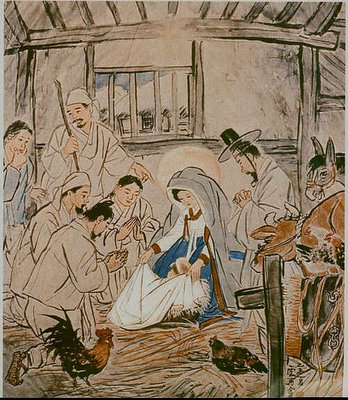
Here's wishing you and yours a joyous holiday season. And for those of us in Seoul, enjoy the semi-white Christmas.
And last, but not least, for the US military personnel who find themselves thousands of miles away from loved ones while serving in the Middle East, Afghanistan, Korea, Okinawa, mainland Japan, Europe, out at sea, or anywhere else in the world, here's a heart-felt word of thanks this holiday season for your sacrifice and your courage.
For you, a small tribute in the form of a Korean Christmas past:
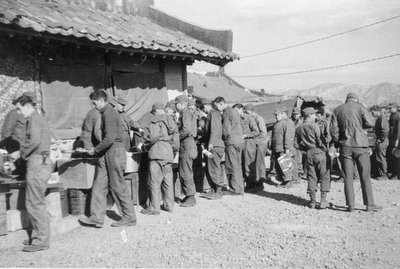
From this website of Paul Noll:
After we left Taejon we went to Taegu and camped there for a while. On Christmas day we had a Christmas feast with Turkey, dressing, sweet potatoes, pumpkin pie, mashed potatoes, green beans, nuts, cake, celery, cranberry sauce, eggnog, milk, coffee, and other things I have forgotten about.
Tears come to my eyes as I write and think about that wonderful Christmas and the effort the army went to, to make it feel a little bit more like home. The officers served the dinner.
My team had a Christmas tree about 7 inches high and we sang songs and thought of Christmases long ago home with our families.
We wondered about our families and how they might be worrying about us here. We wrote home often but mail was hard to get and send. I did get one package from my brother Mark. It was, so help me, a box of handkerchiefs. I kidded him about that when I got home.
Some of the group got packages of cookies, cheeses or salami. Whenever anyone got something it was always gratefully shared with others in the team. We grew to trust and depend on each other very much. This was one of the few times we spent as a company together. Soon after my team went off to set up a station.
God bless you all!
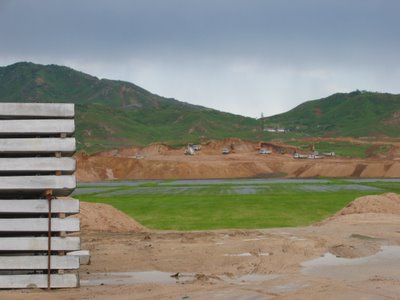 [photo: Thanks go the North-South Joint Industrial Complex, Kaesŏng leads the nation in dug-up dirt and stacked slabs of concrete.]
[photo: Thanks go the North-South Joint Industrial Complex, Kaesŏng leads the nation in dug-up dirt and stacked slabs of concrete.]
The Donga Ilbo has a decent piece talking about the problems facing the prospects of the Kaesŏng (yeah, that's how it should be spelled, not Gaeseong. Kaesong, without the funky ŏ, is also acceptable).Unification Minister Chung Dong-young would like to see it succeed, some of his opponents would like to see it fail just for that reason. Some Korean politicos see it as a chance to foster ties with the North to offset Pyongyang's lingering military threat and Beijing's possible designs on annexing "Inner Chosŏn," a la Inner Mongolia. South Korean businesses see it as a chance to compete with China with their own source of cheap labor.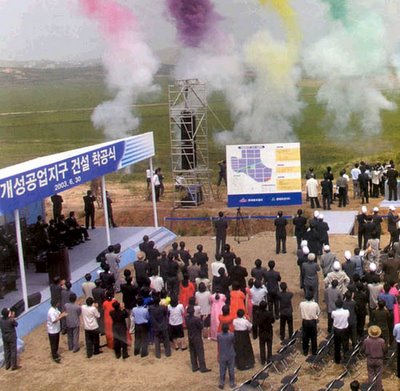 [photo: At the 2003 groundbreaking of the industrial complex, the pretty colored smoke led some to suggest that an early reunification and a delayed move of Yongsan Garrison south to Pyongtaek would make this the site of a future US military base.]But the places is fraught with problems, including North Korean laborers just not used to the demands of working for capitalists. 100,000 workers by next year? It may be a pipe dream.Plus, can North Korea really afford to have that many of its people tainted by exposure to South Koreans (however few of them there are in Kaesŏng) on a daily basis?
[photo: At the 2003 groundbreaking of the industrial complex, the pretty colored smoke led some to suggest that an early reunification and a delayed move of Yongsan Garrison south to Pyongtaek would make this the site of a future US military base.]But the places is fraught with problems, including North Korean laborers just not used to the demands of working for capitalists. 100,000 workers by next year? It may be a pipe dream.Plus, can North Korea really afford to have that many of its people tainted by exposure to South Koreans (however few of them there are in Kaesŏng) on a daily basis?
I have little time today, so I'm going to Marmotize this post...The International Herald Tribune talks about North Korea-centered talks not related to nukes. These involve North Korea, South Korea, the United States, and the World Food Program, the UN food aid agency.
The IHT says that, "at stake is whether the North Korean regime will turn back the clock on economic reforms, strengthen political control over the population and torpedo an ongoing humanitarian aid effort." With the North deciding to boot out food providers who demand to keep tabs on their food aid, and with the North returning to a command economy, experts say conditions are ripe for a return of deadly food shortages and worsening malnutrition.
Read the article.
Now it's time for something mundane, but no less important. Some are making noises about a "weakening alliance" given that South Korea has delayed selection of a winner of a $2 billion contract to supply four E-X early warning aircraft, where American aerospace giant Boeing is competing with Israeli aircraft maker IAI ELTA. Some are seeing controversy, too, since the US side has supposedly not yet given permission to IAI ELTA to make a deal with South Korea, but it has for Boeing.
This comes on the heels of U.S. helicopter-maker Bell failing to win a $1.3 billion project from South Korea to develop new multipurpose helicopters, losing to a Franco-German consortium. Some see it as a move to ease decades-long U.S. monopoly in South Korea's weapons procurement, and conservative Hannara Party (Grand National Party) officials have accused the government of not conducting the selection process fairly.
South Korean defense officials defended their decision for this second postponement of the selection, saying the two bidders failed to submit technology data regarding communication devices by an October deadline and that, "It is impossible to decide the contractor without testing the function of such devices due to the importance attached to them." This issue may hit some sore points. South Korea has relied very heavily on American companies and the government for its weapons programs, SNU scientists have said they will investigate, and we expect to see a report in Nature very soon.
 [caption: File photo of Dr. Schatten from the early 1980s, when he was an extra on the set of the Disney film, Tron.]
I've been backing off the story, since I have already said my peace and I'm trying to wait to see what else happens before making any further statements. Meanwhile, I am content for now to rely on other blogs and the news sites for the latest on the scandal. Every now and then I'll comment.
Like right now: Marmot's has a post about a Hankyoreh Shinmun story that Dr. Schatten, erstwhile colleague and collaborator of Dr. Hwang Woo-suk, is going to be sacked.
The Hanky might be jumping the gun, though. I didn't find anything at Google News or Yahoo News (are they clones?) on Schatten's alleged sacking, but I did find this article which includes this information:
[caption: File photo of Dr. Schatten from the early 1980s, when he was an extra on the set of the Disney film, Tron.]
I've been backing off the story, since I have already said my peace and I'm trying to wait to see what else happens before making any further statements. Meanwhile, I am content for now to rely on other blogs and the news sites for the latest on the scandal. Every now and then I'll comment.
Like right now: Marmot's has a post about a Hankyoreh Shinmun story that Dr. Schatten, erstwhile colleague and collaborator of Dr. Hwang Woo-suk, is going to be sacked.
The Hanky might be jumping the gun, though. I didn't find anything at Google News or Yahoo News (are they clones?) on Schatten's alleged sacking, but I did find this article which includes this information:
That has now turned into a curse for the University of Pittsburgh researcher, whose questionable involvement with Hwang is not his first brush with scientific controversy.
At the very least, Schatten faces a formal reprimand once an internal school investigation is concluded.
“I will consider what disciplinary actions are appropriate in this case pending the findings,” said Dr. Arthur Levine, dean of the medical school and Schatten’s boss.
Well, coincidence of coincidence, it turns out that Dr. Schatten was involved in one of the scandals at my alma mater, the University of California at Irvine (UCI), that I mentioned here at Marmot's as an example of crooked scientific practices elsewhere. It also involved unethically obtained ova (UOOs, for those in the trade):
Ten years ago, a criminal investigation of a UC Irvine fertility clinic reached Schatten's lab at the University of Wisconsin.
The Irvine clinic was supplying Schatten with eggs that had been illegally obtained from women for research without their consent. One Irvine doctor was convicted and two others fled the country.
Schatten believed the Irvine eggs were legally and ethically obtained, said Wisconsin bioethics professor Alto Charo, who helped with the school’s investigation. Charo said the Irvine doctors gave Schatten fraudulent documents asserting the eggs were collected properly.
"Jerry Schatten was absolved of any wrongdoing," Charo said.
Wow! I was blown away when I saw that. It's deja-vu all over again. If Dr. Schatten (aka, the Eggman) were Korean, a bunch of people in the echo chamber known as the Korea-related blogosophere would be applying that "Koreans always got an excuse for everything" line. And Schatten got away clean, while others were thrown in jail or had to flee Korea, I mean, the United States.
Oh, wait a minute. Dr. Schatten is Korean... Dr. Hwang himself referred to Dr. Schatten as "my brother."
Anyway, while looking for that news, I found that Wired has an interesting article on one American's personal stake in Dr. Hwang's research: Good luck, Hwang Woosuk.
ADDENDUM TO POST:
This is all coming back to me now. I remember that scandal being a pretty messy affair (I think the Orange County Register won a Pulitzer for it). By itself, it is nothing to target him with, but one can't help but see a pattern emerging with this guy.
In the 1995 criminal investigation, where one person is convicted and two fleed the country, Dr. Schatten:
(a) says he believed the eggs were legally and ethically obtained all along, and
(b) claimed it was the other guys who gave him fraudulent documents asserting the eggs were collected properly, and
(c) put his name on research (as the contact point, just like with Hwang) on published research conducted with the other guy.
And in 2005 we have another case where Schatten:
(a) says he believed the eggs were legally and ethically obtained all along,
(b) claimed it was the other guys who gave him fraudulent documents asserting falsehoods about the eggs, and
(c) prominently placed his name on a research paper in a way that would make it appear that he had been involved in far more of the research than he actually was.
The two cases (right down to having his name on joint research with the unethical egg obtainer, Dr. Asch of UCI), are just too similar to dismiss out of hand any possibility of a pattern. If he's not more involved than you suggest, then he's either very, very unlucky, doesn't know how to judge others' character, or is just a lightning rod for shit happening.
Like I said, since this guy was already either involved with or burned by illegally and/or unethically obtained eggs, it seems odd that he would have been so nonchalant about this issue here and now.
I think, in all likelihood, Dr. Hwang is ultimately and primarily responsible for whatver mess comes out of this, that needs to be made clear. But Dr. Schatten is no babe in the woods. His involvement is probably deeper than just proofreading. He is no small-time doc himself, so I find it difficult to believe he was all starry-eyed to the point of being rendered senseless about the chance to work with Hwang.
In the 1995 case, Dr. Asch of the UCI scandal fled to Mexico, and he's not talking, so all Dr. Schatten would have to do is plead that he was "duped" by the crafty Argentinian and the Chilean working with him, and he's off the hook. Lo and behold, something similar happens, why not go ahead with the same tried-and-true tactic?
That's just a theory.
The mind-boggling events surrounding Dr. Hwang Woosuk's apparent cloning chicanery demonstrate the ugly side of some Koreans' drive to push the country (or themselves) ahead at the expense of integrity, honesty, ethics, and even safety.
But while excessive nationalism can poison otherwise noble aims, national pride in the right measure has been an incredible motivating influence in Korea's drive to make real progress. Koreans were willing to make necessary sacrifices, work long hours, and live frugal lives in a concerted effort to bring the nation's economy up to the level of advanced countries.
Technological and industrial achievement has long been geared toward competing with and beating former colonizer Japan in particular, as witnessed by the automobile, shipbuilding, electronics, and communications industries.
And on the pages of this blog, we have another case in point, the four tireless men whose sole mission is to bring the "Tokto is our land!" message to any venue possible. Their drive and determination has given them the will to plumb the deepest depths of human creativity so that they can develop the innovative technology needed to spread the "Tokto is our land!" message wherever possible.
We have already seen such results in this picture, the repercussions of which are not yet fully appreciated. These four men developed time travel, a truly amazing accomplishment that has the potential to benefit not just Koreans wanting to spread the "Tokto is our land!" message, but all humanity. Think of the potential to prevent wars, warn people of impending natural disasters, or allow non-profit do-gooder organisations to augment their meager budgets by making in-the-know bets on sporting events at Vegas casinos. Could any of this have been possible without a heavy dose of Korean jingoism?
And now we have evidence of this incredible breakthrough: These four visionaries have developed the necessary technology to give the Moon a livable environment.
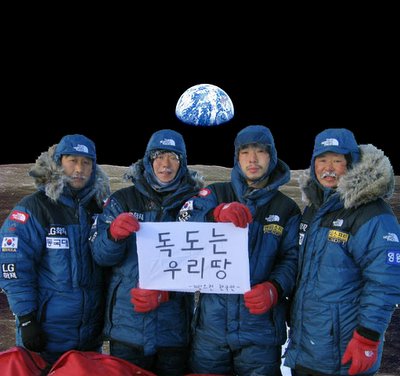 Think of what an incredible development this is. Right now, we here on Earth are running out of room and resources, but a Moon with livable conditions will allow us to exploit that orb as well, thus forestalling complete destruction of our own planet for a few decades at the very least. Ironically, the availability of these resources brought to us by the "Tokto is our land!" drive may make Japan's claims on the islands, known to Japanese as Takeshima, unnecessary. Almost certainly, Korea and Japan will join hands and together exploit the Moon as the closest of friends (so long as the Japanese realize that 달도 우리 땅이다!). Of course, further development of Moon-inhabiting technologies will be necessary. It is clear from these photos that the atmosphere there, while obviously oxygen-rich thanks to these four geniuses, is probably still too cold for comfortable human existence, as evidenced by the thick "North Face" clothing and the ice crystals forming on the moustache of the man on the far right. But again, national pride will play a role in overcoming such hardship: Koreans wishing to be a part of this amazing national achievement will likely be lining up to live in the Moon's sub-freezing temperatures, just as long as one of them sets up a PC-bang or a video store, and maybe a "soju tent" with a space heater.
Think of what an incredible development this is. Right now, we here on Earth are running out of room and resources, but a Moon with livable conditions will allow us to exploit that orb as well, thus forestalling complete destruction of our own planet for a few decades at the very least. Ironically, the availability of these resources brought to us by the "Tokto is our land!" drive may make Japan's claims on the islands, known to Japanese as Takeshima, unnecessary. Almost certainly, Korea and Japan will join hands and together exploit the Moon as the closest of friends (so long as the Japanese realize that 달도 우리 땅이다!). Of course, further development of Moon-inhabiting technologies will be necessary. It is clear from these photos that the atmosphere there, while obviously oxygen-rich thanks to these four geniuses, is probably still too cold for comfortable human existence, as evidenced by the thick "North Face" clothing and the ice crystals forming on the moustache of the man on the far right. But again, national pride will play a role in overcoming such hardship: Koreans wishing to be a part of this amazing national achievement will likely be lining up to live in the Moon's sub-freezing temperatures, just as long as one of them sets up a PC-bang or a video store, and maybe a "soju tent" with a space heater.
 It is very cold outside right now. It's the middle of the damn day and it's only -8° Celsius (18° Fahrenheit for those of you in Rio Linda). Plus it's windy. And when it's that cold and this windy, the chilly air has a way of finding whatever crack you have in your abode and sneaking in. And that means it's time to break out the Homer feet. I am from Orange County, California, where we never have weather this, and the one thing I can't stand is having cold feet. So while this may look ridiculous, I am now comfortable again. From the Weather Channel's site (I can't get their icons to copy):Mostly Cloudy
It is very cold outside right now. It's the middle of the damn day and it's only -8° Celsius (18° Fahrenheit for those of you in Rio Linda). Plus it's windy. And when it's that cold and this windy, the chilly air has a way of finding whatever crack you have in your abode and sneaking in. And that means it's time to break out the Homer feet. I am from Orange County, California, where we never have weather this, and the one thing I can't stand is having cold feet. So while this may look ridiculous, I am now comfortable again. From the Weather Channel's site (I can't get their icons to copy):Mostly Cloudy
18°F ... Feels Like 5°F
Updated Dec 17 12:00 p.m. Local TimeYikes! I'm not going outside today.UPDATE:I did go out that day. That night, in fact. I had to drive someone home, so I got into the Kia and warmed it up for what was probably too short a time (ten seconds maybe?) and the car started to sputter around Namsan Ring Road. In fact, the engine turned off right in the middle of the road, but I had already gotten into the right lane by then and had my hazards on. I cranked it and it just wouldn't start.The vehicle is LPG (liquefied petroleum gas, known as "LP Gas" in California), and I must admit I had forgotten to let the remaining gas in the fuel line burn off before turning off the car, as your supposed to do in very cold weather. If it's completely frozen, the car won't start at all, but if it's just a little clogged, it will turn off and you have to re-start it and keep it revved (this has happened before). After about ten minutes of driving, the car's fuel line is normal.But the battery was obviously not giving enough juice to turn it over, so I called my insurance company to have them send out (for free! I love Korea's service-oriented corporate mindset) a car to give me a jump (they also fix flats and do other minor things for free). The guy came, gave me a jump, and then checked my battery and said I had better change it. I followed him to his shop (it was 11 p.m. at this point) and he changed the battery. There was a noticeable difference over how long it had been taking to start the car. Finally, I was on my way.But during that period where I was waiting, what a nightmare! It was -11° C according to the "out side temperature" reading my car has on the temperature control panel. That's 12° Fahrenheit. And I didn't have the car on to get heat. Nor was I properly dressed for being out in such cold, since I thought I wouldn't be outdoors any longer than it took to go from my apartment door to my car and back. I had left my Homer feet back at the house. No gloves, no long-johns, no thick sweater. I had a ski jacket on, but my lower legs were cold and the only way to keep my hands from going numb was by sitting on them. I was a little nervous about putting my hands inside my pants to keep them warm because (a) I was still sitting in traffic and I might have to jump out of car at a split second's notice, and (b) I was close enough to the sidewalk that passers-by might wonder what I was doing parked along the side of the road with my hands in my pants. I was also parked close to one of those ROK Marine membership halls, and I'd hate to incur the wrath of a ROK marine whose girlfriend just came up to him and told him I had my hands in my pants while she was walking by my car. Anyway, I'm glad to be back home, sitting on the toasty ondol floor, because right now it's...Mostly Cloudy
16°F ... Feels Like 3°F
Updated Dec 18 12:00 p.m. Local TimePlus, there have been snow flurries all morning.
Most residents of Korea who are from overseas are highly skeptical of some Koreans' belief in so-called "fan death," the possibility that somehow exposure to an electric fan in a hot, enclosed room can lead to one's expiration. [My own take on alleged "fan death" is that it is often being used deliberately or inadvertently to mask death by some other means, such as murder by asphyxiation, alcohol poisoning, choking on one's own vomit, or the heart simply giving out for some other reasons, such as stress.]But while "fan death" is derided as snopes-ish myth, it seems more than a few bloggers are concerned about the possibility that Dr. Hwang Woo-suk, of cloning infamy, might succumb to another type of physical demise that is a little too common here: shit-hits-the-fan death. In Korea, not unlike its neighbor Japan where this is more famous, a person hopelessly caught in the middle of swirling storm of humiliation may seek to avoid any further loss of face for him/her or his/her family or associates, by quietly seeking quietus. This sometimes occurs even when the person seeking death is not the cause of the embarrassment him/herself.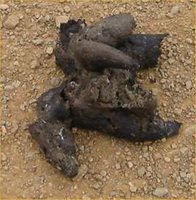
 [Above: shit (left) and fan (right). By themselves, they are relatively harmless, but in combination, they can be deadly.]We see this with executives or politicians jumping off buildings or bridges, or sometimes hanging themselves. Disembowelment (e.g., seppuku or hara-kiri) is less common for "shit-hits-the-fan death," but is still done in Korea as a form of protest [non-pleasant picture of this coming soon].At any rate, several bloggers/commenters have already brought up this possibility: Biggdogg's comment sums it up nicely:
[Above: shit (left) and fan (right). By themselves, they are relatively harmless, but in combination, they can be deadly.]We see this with executives or politicians jumping off buildings or bridges, or sometimes hanging themselves. Disembowelment (e.g., seppuku or hara-kiri) is less common for "shit-hits-the-fan death," but is still done in Korea as a form of protest [non-pleasant picture of this coming soon].At any rate, several bloggers/commenters have already brought up this possibility: Biggdogg's comment sums it up nicely:If a close eye is not kept on Hwang (and I mean 24 hours) he will be found dead of apparent suicide. If he doesn't kill himself, someone else will kill him...For one, there are just too many reactionary nuts out there who will see Hwang as a national embarrasment and want to kill him.
I'll have more after Typepad completely recovers and lets me sift through people's responses, but one choice one that I remember is someone saying that where he/she is (Japan), Hwang would know what to do after embarrassing the entire country.ADDENDUM TO ORIGINAL POST: Darin informs me that it was he who made the above comment, and he did so right on this blog:
He's lucky he's not in Japan though, they'd have him testifying for his life in-front of the Diet tomorrow for national embarrassment after which they'd hand him a knife and tell him he knows what he has to do.
Don't be so sure that wouldn't happen here, too. Although he's more likely to be forced into exile in some isolated Buddhist temple somewhere.
The Christmas season, for some reason, always reminds me of my part-time job one winter break at UCI, when I was hired to work at Disneyland.
That's right: I worked at Disneyland. At some point, every young person in Orange County is required to do this. It's like the military draft, getting a tan, or learning to surf.I had a Fu Manchu-Pancho Villa moustache when I got hired, so they told me I would have to shave it off to work there.
"No facial hair allowed," the guy said.
"Does that mean I have to shave off my eyebrows, too?" I asked.
That remark was greeted with a blank stare.
Then I added, "Walt Disney had a moustache. Would he have had to shave it off if he wanted to work here?"Blank stare again, so I added: "I mean, if they thawed him out of the cryogenic chamber?"
The first day of Disneyland employment you go through brainwashing/training. Even for me, who was hired to be a sweeper (because of the moustache, they though I was Mexican, so they made me a sweeper; if only they'd thought I was Jewish*, then I could have had a job handling money. Stupid anti-discrimination laws preventing them from asking what your ethnic background is! Or isn't.).
They tell you you are cast members, not employees. They tell you all about what a happy place it must remain for the visitors, even if the cast members are miserable.
Yes, I worked at Disneyland for just one day.
I got paid fifty bucks to sit through brainwashing. I still love visiting the place though (I have nieces and nephews, after all).
* I am mocking stereotypes here, not supporting them.
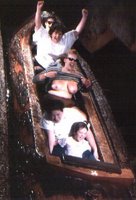








 Rather than give you standard Disneyland pictures that include Mickey Mouse or that Sleeping Beauty Castle thing, I have decided to show you pictures of real-live guests enjoying themselves at "The Happiest Place on Earth." Sort of my own take on Lost Nomad's "Girl Tuesday" series, I am hoping this will boost my readership to 300 a day. Let's just say these people are having a little too much fun on the Splash Mountain ride, but what they're doing is very, very common.
Rather than give you standard Disneyland pictures that include Mickey Mouse or that Sleeping Beauty Castle thing, I have decided to show you pictures of real-live guests enjoying themselves at "The Happiest Place on Earth." Sort of my own take on Lost Nomad's "Girl Tuesday" series, I am hoping this will boost my readership to 300 a day. Let's just say these people are having a little too much fun on the Splash Mountain ride, but what they're doing is very, very common.
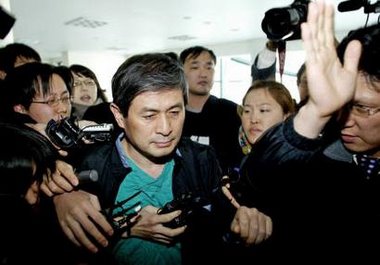 I first saw it at Marmot's Hole, and Marmot got it from Oranckay, who had linked an OhMyNews article by Todd Thacker: Dr. Hwang Woo-suk's data on patient-specific cloned embryos was faked. Science Magazine, which had published his study in May, was already talking about the questions dogging Dr. Hwang, though they don't yet include an update.
I had wondered on this blog if he was a visionary or a charlatan, and it turns out the latter is the case. Korea as a whole must begin a period of deep, probing self-examination. As I wrote before:
I first saw it at Marmot's Hole, and Marmot got it from Oranckay, who had linked an OhMyNews article by Todd Thacker: Dr. Hwang Woo-suk's data on patient-specific cloned embryos was faked. Science Magazine, which had published his study in May, was already talking about the questions dogging Dr. Hwang, though they don't yet include an update.
I had wondered on this blog if he was a visionary or a charlatan, and it turns out the latter is the case. Korea as a whole must begin a period of deep, probing self-examination. As I wrote before:
But if it turns out that this was like the cold fusion debacle, that the cloning process was a sham, then Korea has a lot of soul-searching to do it. Only after that soul-searching can the opportunity be grasped to bounce back from such humiliation through an overhaul of how scientific research is conducted here.
Marmot says, "Oh my fucking God," but I am going to go on record saying I almost feel a sense of relief. Call me crazy, but this appears to be such a slam dunk that only the most blindly nationalistic people will deny that Korea's great hero of science, Dr. Hwang, had fudged his data, and shat all over Korea's technological reputation in the process.
This is a harsh, harsh lesson, but a necessary one, apparently. People wanted Dr. Hwang's results to be real for reasons of scientific advancement (that was certainly the case with me) and also to boost national stature. So strong was the second reason with some people that any attempt to reasonably question the data was met with hostility. Witness how MBC's "PD Report" was vilified. (And while it's true that they may have used unethical means to put together their report, they deserve kudos for going against the grain and trying to get to the bottom of a story so few others were willing to).
Korea as a collective entity needs to learn the importance of crossing one's t's and dotting one's i's, and double-checking and even triple-checking when necessary. 빨리 빨리 won't fly in the modern world.
This is a blow, but I also have great faith in Korea's collective ability to bounce back from a deserved setback. In 1997, European banks were calling the Korean economy "moribund" and worse, but under the Kim Daejung administration, soul-searching led to a major restructuring of how things were done, and Korea came back stronger than ever (though there are still reforms that need to be done).
Similarly, Hyundai swaggered into the American car market with plans to dominate with low-cost automobiles, only to be practically laughed out of the competition with such piss-poor quality cars that few would buy them. Hyundai learned a harsh but important lesson, went back and completely restructured their plan of attack, and is now producing vehicles praised for their quality and styling.
Scientific research will be scrutinized more carefully. People are going to realize that ethics are an essential part of research, not a luxury or a means to beat Korea up.
The question now is, were all of Dr. Hwang's cloning projects faked, or is it just the attempts to clone patient-specific cells? After all, Dr. Hwang's team has also been credited with being the first to clone human cells, sometime earlier. There's also the dog and some other animals.
How much of it is real? Is all of it fake? Is there anything that can be salvaged from his research? I hope so, but not for Korea's scientific stature. I hope so because I still feel that therapeutic cloning is still an important field that deserves attention.
But for now, my hat is off to Baduk, who has been beating this drum for quite some time.
"Maybe I should write a letter to Koizumi, because he has done something for abductees." -- ROK citizen at Seoul Summit for North Korean Human Rights presenting a letter to his father, who was kidnapped in 1971 by North Koreans and has been held in the DPRK ever since
And speaking of Lefkowitz, President Bush met him for the first time yesterday (in an official capacity, at least). I wonder which one could school the other more on the issue. It's a good thing they've both met Kang Cholhwan, a person who clearly is not soft on human rights in North Korea but who also is against a military approach.
I'm still a little ticked off that Lefkowitz ducked out of the Seoul Summit on Human Rights before the question-and-answer segment, because my question on China was directed at him (and the ruling Uri Party representative).
POST ADDENDUM:
Asiapundit has an important update to this story that includes rumors that the families of the dead are being given the Hobson's choice of collecting blood money or getting beaten and receiving nothing. Meanwhile, "the authorities bombed the bodies they found and kept, so that they have 'evidence' on hand to show that villagers died by explosives."
Not to make light of this, but I'm guessing they haven't seen CSI. It sounds like China needs to bring independent overseas experts in on this. Now.
ORIGINAL POST:
San Nakji asked... no, challenged me to make a statement on the recent news of a massacre at a Chinese village in which as many as twenty people or more have reportedly been killed. Since then, there has been a clear effort by the Chinese authorities to cover it up, even to the point, say villagers, of dragging bodies away.
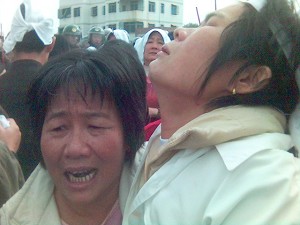 Mourners in Dongzhou [photo from Asiapundit]
Many people are shocked. I am dismayed, definitely. But to those who have been thrown by this, I ask you: This surprises you how?
Mourners in Dongzhou [photo from Asiapundit]
Many people are shocked. I am dismayed, definitely. But to those who have been thrown by this, I ask you: This surprises you how?
To put less fine a point on it: What made you think this was no longer characteristic of the Communist regime in China?
Everybody talks up the economic development — and the economic opportunities — to be had in China, and this tends to drown out the reality there. Yes, there is considerably more freedom there, especially in the cities, but we are kidding ourselves if we think the regime there is no longer a monstrous, multi-tentacled controlling force. Almost certainly, it is not as bad as North Korea, but everybody knows of Pyongyang's nefarious ways. When did we stop knowing this about China?
China exercises a great deal of control over its citizens in the countryside, which, in stark contrast to the populations of South Korea, Japan, North America, Australia, and Western Europe, make up a whopping 3/4 of the total population. That's three times the population of the U.S. living away from where the gaijin/gweilo can see them.
The Communists control their movement, where they can live, until recently whom they can marry. With a series of often devastating "disincentives," they control how many children they can have.
There is no real freedom of religion. They execute people, often publicly, after summary trials, sometimes on charges that would not warrant the death penalty even in Western countries (including South Korea and Japan) that still use capital punishment.
People's ability to bring up grievances is limited, and often the local party apparatus comes down on hard to those who dissent from their rule. People who are not officially indicted are often beaten--sometimes to death--in jail cells with no oversight.
Even in the cities, dissent is NOT tolerated. People are jailed and sometimes beaten and tortured for saying things exactly like what I'm saying now. If someone like me were in the PRC, he or she would likely be engaging in "self-censorship" to avoid an unwelcome knock at the door.
So is it any surprise that in some small, isolated village the authorities would answer dissent by shooting at the dissenters, killing a couple dozen of them? And is it any surprise that they would fall over themselves trying to keep it under wraps? After all, this is the same China that hid information about the SARS outbreak and the recent environmental disaster in Harbin, the result of which may have meant
many more deaths.
In the United States and other countries that are free-wheelingly doing business in China, this is an inconvenient thing to think about. Some would even call the human rights issue in China a red herring.
Well the red from that herring is the color of hemoglobin. But it will be tolerated, as long as it doesn't get to the level of Tiananmen, right? Lots of little village incidents might surpass Tiananmen in death toll, but that's okay, because we won't know about it. So Beijing hopes.
Since President Clinton, in the mid-1990s, joined the Republicans in ending the annual debate over whether economic development should be tied to human rights in China, the United States hoped things would get better. I'm not so sure that has been the case.
We talk of North Korean human rights abuses--and they are serious--but we act as if China's human rights abuses are incidental or even an aberration. But are they really?
China has nearly SIXTY TIMES the population of North Korea. If every village government in North Korea is committing major abuses, then if just one out of every fifty Chinese village governments is doing the same thing, that would SURPASS the number of tortures or killings of North Korea. Where do we stand on the issue then?
The International Olympic Committee gave the 2008 Olympiad to Beijing in the hopes that they, like South Korea, would be democratized by the experience. But the two countries are world's apart in terms of where they were coming from and how they treated their people. South Korea under Presidents Park and Chun was no democratic picnic, but the people enjoyed far more freedoms and the political parameters were far narrower than the Chinese have. Plus, South Korea had more impetus to change: its entire image was riding on how it was perceived and it was in no position to thumb its nose at the democratic demands of the rest of the world.
The street demonstrations of 1987 led to President Chun stripping away the remaining obstacles to direct democracy. In Beijing, I fear that won't happen. If anything, public dissent will likely lead to greater suppression, and more incidents like this, not a loosening of the Party's monopolistic grip.
This means I am torn about boycotting the Beijing Olympics. I do believe now is the time for citizens around the world to stand up and threaten to change the channel (and thus cut off the revenue stream) if certain human rights conditions are not met. Among them would be the allowing of free assembly and the ability to air grievances, along with the equally important demands that Beijing stop rounding up North Koreans and sending them back to North Korea where they and their family members face certain imprisonment, likely torture, and possible death.
At the same time, we in the West need to end the fantasy that it is okay to buy blood-stained cheapery from Walmart, E-Mart, Carrefour, Mitsukoshi, the 100-yen Store, and Circuit City. China is doubly responsible for major human rights violations: those perpetrated on its own people, and those willingly and knowingly allowed in its client state, North Korea.
This incident should be a wake-up call: mini-Tiananmens in China are not a thing of the past.
...
A more modern archive, but one that speaks to issues faced today by many people.Excerpted from "Want a Baby?"
Terry Ulick, 34, and his wife Linda, 45, of Bartlett, Ill., were rebuffed by seven agencies in their six-year quest for a child. One agency said he was too fat and she was too old. "The biological rules of nature are that any two people can get together and have a child," says Terry. "When it comes to adoption, the rules of nature don't apply."
So the Ulicks, like so many couples, have had to look elsewhere. Some go to countries where local custom discourages adoption. In the past, South Korea was the prime source; in the '80s alone, more than 40,000 Korean children have been brought to the U.S. But in recent years Koreans have begun to question the propriety of shipping so many infants abroad. The government has stepped up its promotion of birth control and urged Korean families to adopt. Last year the number of children coming to the U.S. fell 18%, and prospective parents must find other channels.
While South Korea cuts back, other countries awash with orphans or abandoned children try to remove potential obstacles. Thailand, India and Peru are possible sources. Douglas Tifft and his wife Bonnie MacAdam tried the agencies, avoided the lawyers and waited a year for a Korean baby before looking elsewhere. "The process can be heartbreaking," says Bonnie. But when they applied for a Peruvian baby, the phone call came six weeks later, and they soon boarded a plane for Lima. Last week Bonnie returned to New Hampshire with five-month-old Rosa. "Once you have the baby in your arms," she says, "it seems worth all the waiting, money, traveling and hassle."
For parents who have set their hearts on white American infants and been endlessly wait-listed or rejected by the agencies, the other choice is to go private. At the hub of so-called independent adoptions, meaning placements outside the agencies, are the ranks of lawyers, who usually charge from $1,500 to $4,000 for their legal work. They typically steer couples through a tangle of laws that vary wildly from state to state.
Among the legal considerations: Are lawyer-brokered independent adoptions allowed in the state where the couple resides? (Six states prohibit private adoption.) Which of the birth mother's expenses can be paid by the adoptive parents? Hospitalization? Maternity clothes? How long does she have to change her mind about giving up her child? Does the birth father, who in most cases is out of the picture, have to give his consent? Because of their laws, California and Texas have become magnets for couples seeking independent adoptions, while Minnesota and Michigan have none. "There are probably more infants from Minnesota placed in California than in Minnesota itself," says Beverly Hills lawyer David Keene Leavitt, who has handled more than 7,000 adoptions in 28 years.
Note to students of world diplomacy: denying Nazi German atrocities bad; denying Imperial Japanese atrocities may be okay.
From the Los Angeles Times:TEHRAN, Iran — Iranian President Mahmoud Ahmadinejad escalated his anti-Israeli rhetoric today, calling the Holocaust a "myth" used by Europeans to create a Jewish state in the heart of the Islamic world.
His remarks drew swift condemnation from the White House, Israel, Germany, France and the European Commission. Germany said the remarks would affect upcoming negotiations over Iran's nuclear program, and European Commission President Jose Manual Barroso said Iranians "do not have the president, or the regime, they deserve."
Ahmadinejad last week questioned whether the Nazi destruction of 6 million European Jews during World War II occurred and said Israel should be moved to Europe. He also provoked an international outcry in October when he called for Israel to be "wiped off the map."
But today was the first time he publicly denied the Holocaust. Touring southeast Iran, Ahmadinejad said that if Europeans insist the Holocaust happened, then they are responsible and should pay the price.
"Today, they have created a myth in the name of Holocaust and consider it to be above God, religion and the prophets," Ahmadinejad told thousands of people in the southeastern city of Zahedan.
"If you committed this big crime, then why should the oppressed Palestinian nation pay the price?" Ahmadinejad asked rhetorically.
"This is our proposal: if you committed the crime, then give a part of your own land in Europe, the United States, Canada or Alaska to them so that the Jews can establish their country," he said, developing a theme he raised in Saudi Arabia last week.
The White House denounced the comments and said they show why Iran must not develop an atomic bomb.
"All responsible leaders in the international community recognize how outrageous those such comments are," White House spokesman Scott McClellan said, adding that they "only underscore why it is so important that the international community continue to work together to keep Iran from developing nuclear weapons."
German Foreign Minister Frank-Walter Steinmeier called the remarks "shocking and unacceptable." He said the German government had summoned the Iranian charge d'affaires to make its displeasure "unmistakably clear."
"I cannot hide the fact that this weighs on bilateral relations and on the chances for the negotiation process, the so-called nuclear dossier," Steinmeier said, referring to European talks with Iran on its nuclear program.
The German government said Chancellor Angela Merkel would call on the European Union to press for international condemnation at the United Nations.
Israeli Foreign Ministry spokesman Mark Regev said: "The repeated outrageous remarks of the Iranian president show clearly the mind-set of the ruling clique in Tehran and indicate clearly the extremist policy goals of the regime.
"The combination of fanatical ideology, a warped sense of reality and nuclear weapons is a combination that no one in the international community can accept," Regev added, referring to allegations that Iran is developing nuclear bombs.
Avner Shalev, the director of Yad Vashem, Israel's memorial to the Holocaust in Jerusalem, said Ahmadinejad's comments required a "stronger response from world leaders."
"Every genocidal statement has to be taken seriously because the Holocaust occurred, and the world knows it. Therefore, we don't just condemn these comments, we believe that the international community and the United Nations should deal with them more seriously," Shalev said.
In Strasbourg, France, Barroso said the president's comments were "completely unacceptable."
"This shows the nature of (Iranian) regime," he said. "With the great respect I have for that country, that people, the great history of that country, I say they do not have the president, or the regime, they deserve."
France's Foreign Ministry also condemned Ahmadinejad's remarks.
Ahmadinejad said the West had harmed Muslims, invaded their countries and plundered their wealth.
"If your civilization consists of aggression, making oppressed people homeless, suffocating the voices of justice and bringing poverty to a majority of the world's people, we say loudly that we hate your hollow civilization," he said.
Ahmadinejad has been unapologetic about taking Iran on a more openly defiant course, insisting on Iran's right to develop its nuclear program -- which it insists is peaceful -- and often using rhetoric reminiscent of the 1980s heyday of the Islamic Revolution.
The president's views sharply conflict with those of predecessor Mohammad Khatami, a moderate who used to call for dialogue among civilizations and promoted a low-key understanding with the United States that stopped short of diplomatic relations.
Inside Iran, Ahmadinejad's remarks have been criticized by some of his conservative allies, who fear he is hurting the country's image. Moderate Iranians have called on the ruling Islamic establishment to rein in the president.
But Supreme leader Ayatollah Ali Khamenei, who has the ultimate say, has backed Ahmadinejad's calls for Israel's elimination.
Ahmadinejad criticized the United States for refusing to sell Iran spare parts for its civilian planes as part of its long-standing embargo against the country.
Iran has suffered a series of plane accidents -- most recently on Dec. 6, when an aging U.S.-made military transport plane crashed into a tall building in Tehran, killing 115 people. Iranian officials have blamed Washington for the crashes, saying they are partly caused by the difficulty in obtaining spare parts.
"No country is authorized to impose spare-part sanctions against another country. Nothing can justify this," Ahmadinejad said Wednesday.
Ahmadinejad said the denial of spare parts was a reason why Iran would not trust Western promises to give it nuclear fuel. The country is currently at loggerheads with the West over its insistence on enriching uranium to fuel its first nuclear reactor, which is due to start generating electricity next year.
The Europeans, with U.S. backing, do not trust Iran to have its own enrichment process since highly enriched uranium can be used for nuclear warheads. Europe has offered to sell enriched uranium for the reactor, but Iran has rejected this.
The United States is pushing to have Iran referred to the U.N. Security Council, where it could face sanctions for violating a nuclear arms control treaty.
Ahmadinejad said that if Iran gave in on the nuclear dispute, there was no guarantee the West might not refuse to sell nuclear fuel in the future.
"I assure you that we won't step back one inch from our nuclear rights," the president told the crowd, drawing chants of "Death to America!"
Iran is due to resume negotiations on the nuclear issue with envoys from Britain, France and Germany starting Dec. 21 in Vienna, Austria.
Note that the Japanese were using the American colonization of the Philippines as a justification of sorts for their colonization of Korea. I dare say most Americans are not only NOT aware that the United States has been a colonizer, but also that it was at times, arguably, a brutal colonizer. Probably considerably less than most colonizers, though.Excerpted from "Calm After Calls"
This business of making chests and punching pillows was left to dynamic Yosuke Matsuoka. He is as unofficial a spokesman as the Foreign Office could desire being no longer even a member of the Diet. But China and the world know that he is always close to the government's ear, that he once served as Vice Minister for Foreign Affairs and that it was Chief Delegate Yosuke Matsuoka who marched the Japanese delegation out of the League of Nations 14 months ago (TIME. March 6, 1933). Last week he wrote:
". . . France could seize the extensive territory of Indo-China and extend her 'sphere of influence' up into the Province of Yunnan in China proper, and no criticism comes from Europe or America, but when Japan objects to French extension of possession to two small sparsely populated islands . . . from which our people have long obtained guano, American and European newspapers . . . state that this is further evidence of our aggressive intentions. . . .
"America may acquire the Philippine Islands, Asiatic territory 6,000 miles away from her shores, but when Japan takes control of Korea, a country smaller in territory than the Philippines and only 100 miles away from her island borders, the action is denounced. . . . But in fact we, being Asiatics, are far more capable of dealing with other Asiatics in their best interests than are Americans or Europeans. For example, in bringing order out of chaos in Korea we killed far fewer people than the Americans killed in suppressing the independence movement in the Philippines. . . ."
As Sir John Simon soothingly assured the House of Commons that Japan had virtually withdrawn her claims in regard to China, Secretary Hull made public the "substance" of a statement he had instructed Ambassador Grew to deliver to the Japanese Foreign Office. Politely but forcefully it warned Japan against trying to establish hegemony in the Far East by stubbing other people's toes. The warning: ". . . No nation can, without the assent of other nations concerned, rightfully endeavor to make conclusive its will in a situation where there are involved the rights, the obligations and the legitimate interests of other sovereign states." When on May Day the Japanese Government finally published the Hirota note in Japan, it pointedly ignored Secretary Hull's declaration.
For those of you who aren't familiar with the name, the Holt Agency is a major entity in international adoption. In Korea, they are practically synonymous with overseas adoption, even though several religious-based organizations are also highly involved with placing children in proper homes abroad. The December sun glanced through the big picture windows in the living room of Harry Holt's 13-room farm home perched on a hill near Creswell, Ore. There sat Holt, 52, a thickset man with a ragged mustache and shaggy eyebrows, and his wife Bertha, 53, her unrouged face a picture of contentment. Around the couple cuddled eight button-eyed children, aged 3 to 5. Their thin voices mingled with the Holts' as they sang:
Jesus loves the little children of the world,
All the children of the world, Red and yellow, black and white,
All are precious in his sight, Jesus loves all the little children of the world.
Orphans' Airlift.
For Bertha and Harry Holt, as well as for the children, the hymn has a special meaning. Two and a half years ago Harry Holt flew to Korea, hunted through orphanages, disease-ridden huts and gutters, rounded up Korean babies fathered by American G.I.s and abandoned by their mothers, and took them home. Pushing a special law through Congress permitting them to adopt all eight children (U.S. law permits families to adopt only two), the Holts, with the help of their own six youngsters (now aged 11 to 24), set out to rear the Koreans as their own. As the news of the enterprise spread, they soon found themselves operating an airlift on behalf of other families in the U.S. By last week they had arranged for the transportation to the U.S. and the adoption by families all around the country of no fewer than 575 mixed-blooded foundlings.
A retired lumberman, prosperous farmer (income: $20,000 a year) and devout member of the Willamette Gospel Church, Harry Holt began his crusade after he saw a documentary film that showed the plight of U.S.-Korean babies, many of whom were left by their mothers to die. Others, he learned, were ostracized by other Korean children. "Harry," says Bertha Holt, "could never forget those tiny outstretched arms. Finally, he realized that the Lord was speaking to him to do something for these children."
Hopeful, Thankful & Glad.
Though he suffered through two heart attacks, Holt journeyed to Korea eight times. In Seoul he built his own orphanage, now supervised by two of his daughters. Back home, he turned the Holt playroom into a bustling office, hired secretaries to deal with requests from potential foster parents. The Holts now keep three bulging file cases: Hopeful ("Letters from people hoping for a child"), Thankful ("A child has been assigned and is awaiting transportation in Korea") and Glad ("The child is in America").
Families adopting children through the Holts pay a fee of $343, which includes adoption, visa and transportation costs plus $15 for a "home study." The Holts hire a private investigation agency to conduct the home study to be sure the applicants can take care of the youngsters, and that they are churchgoing Protestants (they refer Roman Catholic and Jewish requests to other agencies). Biggest difficulty: most Negro families want girls, but there are not enough Negro-Korean baby girls to go around.
At the dinner table one evening last week, Harry Holt surveyed the row of faces that no longer were strangers. Said he: "I feel that any one of these kids is worth all it costs. I had to see an awful lot of little kids die. I hate that. We try to be thankful to the Lord every day, and we are. I'm sure that the Lord has accomplished a great deal, and we are glad to be used of him to accomplish this."
If the Japanophiles of yesteryear had their way, my Japanese language skills would be like my Korean skills, and my Korean language skills would be like my Japanese skills. It's interesting to note that Yasukuni Shrine and finger-chopping were in the news way back in the 1930s and the 1940s. Plus large books were only three bucks.
Japan's Collective Führer
GOVERNMENT BY ASSASSINATION—Hugh Byas—Knopf ($3).
With the possible exception of Joseph Clark Grew, there is no one as well qualified to explain the Japanese to Americans as Hugh Byas. Ambassador Grew spent ten years in Japan, Hugh Byas spent 36. Both loved the Japanese and were apparently loved by them. Both prefer facts to hysteria.
As Tokyo correspondent of the two most formidably restrained newspapers in the world, the London Times and the New York Times, Hugh Byas could afford not to be a hawker of sensations. In late years it was a rare sight to see the red-faced Scot walk with his heavy cane into the lobby of the Imperial Hotel and sit down with the rumor factors there. He never rushed down to Yokohama to find a friend in the saloon of a luxury liner and ask him to smuggle out an item that would burn up the mails. He always quoted sources, never "informed circles." The only ruse of which he was guilty while he was in Japan was the one by which he got his voluminous files out of Japan.
Those files and his Scots honesty make this book the best on Japan since his own The Japanese Enemy (TIME, May 25).
Thesis on Guilt.
The book, paradoxically, is sensational. There are passages about political thuggery which should give American readers the sort of creeps provided by the crazy chapter in Mein Kampf entitled Development of the N.S.G.W.P. (about the first mass meetings of the early Nazis). But Hugh Byas puts sensationalism to work. He makes it document a thesis: guilt for the Pacific war lies not with the Emperor Myth, not with the destiny-drugged Japanese people, not even with murderous fanatics like the members of the Black Dragon, but almost entirely with the Japanese Army & Navy. From that thesis, Byas reasons his way to the clearest and fairest proposals yet advanced for peace in the Pacific.
Persuasion by Thuggery.
Late one Sunday afternoon in May, 1932, nine naval and military officers between 24 and 28 years old got out of two taxis at the side entrance of Tokyo's Yasukuni Shrine, dedicated to Japan's war dead. They were typical "young officers," men with masklike faces. In the shrine they doffed their caps, clasped hands, bowed stiffly. Then they piled back into their cabs and drove to the official residence of the Premier of Japan.
They went about their business as ineptly as a gang of urchins playing cops & robbers. They asked a police sergeant to show them the Premier's private apartments. He refused. The young men got lost in the echoing hallways. A group of three or four other men appeared; the young officers fired in their general direction; the men fled. Some one heard a key turning in a keyhole. Part of the group stormed the door, broke it down, and came on the Prime Minister, a tiny, alert man of 75, and his daughter-in-law, holding a baby. The Prime Minister calmly invited them into the room, lit a cigaret and started a polite conversation.
Another group, led by a Lieutenant Masayoshi Yamagishi, a man of action, burst in. "No use talking," said Yamagishi. "Fire!" One assassin shot Inukai in the neck, another in the stomach. They all ran out and hurried to police headquarters, armed with pistols and grenades, expecting a fight. The place was empty. They drove to the Bank of Japan, threw a grenade at the door. Then they went to the military gendarmerie and surrendered.
Persuasion in Court.
Their trial brought out the young officers' reasons for the assassination. They hoped to strike terror in capitalist and governing classes and bring about martial law, which they believed would be equivalent to military dictatorship. For a while they had considered mass slaughter of the House of Representatives. They thought about murdering Ambassador Grew and U.S. Consul General Arthur Garrels. They even considered shooting Charlie Chaplin who was then visiting Japan.
JUDGE: "What was the significance of killing Chaplin?"
KOGA: "Chaplin is a popular figure in the United States and the darling of the capitalist class. We believed that killing him would cause a war with America, and thus we could kill two birds with a single stone."
The young officers became national heroes. The defense counsel presented 111,000 letters appealing for clemency. "Nine young men of Niigata chopped off nine little fingers in evidence of sincerity and sent them to the War Minister pickled in a jar of alcohol." With the fingers came an appeal for the murderers: "They broke the law but their motives were pure." Schoolboys wrote letters in blood. A German sausage maker contributed ten yen ($3) toward a fund for a monument which would show Inukai shaking hands with his assassins.
During the trial, the young officers and their associates were permitted to sound off for days about militant nationalism. At one point a defendant arose, accused the presiding judge of inattention and indifference to the prisoners' speeches. Far from disciplining the man for contempt, the judge called a recess, tried to talk things over with one of the prisoners, came down with judicial neuralgia, and retired in shame from the bench.
The Romantic Tradition.
"What seems fantastic when written in English," says Byas, "was as normal as the weather in Japan." After the Inukai murder, the first Japanese assassination in which officers did the actual killing, the Army and Navy took more & more to murder in order to get their way. Byas describes in wonderful detail the killing of Major General Tetsuzan Nagata in the War Office in 1935, and the brutal February Revolt in 1936 which grew out of the Nagata trial. This program of crime was rewarding. The threat of assassination could be as effective as assassination. In the end, the military became Japan's collective Führer.
Byas knocks down the myths about Japan's civilian secret societies and blood brotherhoods. There have been hundreds of these, growing, dividing and growing again like amoebae. Their names alone are almost enough to dismiss them: Great Japan Spirit (or Essence) Society, Foundation of the Country Society, League for the Improvement of Administration & Diplomacy, Illustrious Virtue Society, All-Japan Patriotic Conference for a United Front, Patriotic Love-Country Blood & Iron Band.
The exaggeratedly notorious Black Dragon Society (really Amur River Society, romantically translated Black Dragon because the Chinese ideographs for the river mean that) is practically defunct, and its leader, Mitsuru Toyama, is an amiable, doddering, living legend 87 years old. All these societies are reflections of military thuggery rather than causes of it.
Out of War, Peace.
Hugh Byas' program for post-war Japan really boils down to a serious admonition: there must be no thought of peace with Japan without complete defeat of Japan; we must defeat Japan's Army & Navy utterly and finally in war. If we do, he is confident that the peace will almost take care of itself. He thinks the Emperor Myth harmless and indigenous, and believes that forcing revolution would be as disastrous as it proved in Germany after World War I. The Emperor might well emerge himself as a wise and statesmanlike ruler. The Japanese have natural, subjective mechanisms for fixing responsibility, and he believes that they themselves would probably make the militarists pay.
As to specific peace-table proposals, Mr. Byas is modest, as always, and says that his ideas are "simply a contribution to a common pool of ideas that still needs to be enriched by much study." But they are concrete and based on an understanding of the Japanese mind. His formula: Japan should lose all that she has used or could in future use as instruments of violence, but she should be confirmed in all that she has gained by and could only use for peace.
He proposes to deprive Japan summarily of all the mandated Pacific islands, which they have used as anchored aircraft carriers and not for any peaceful end. Manchuria should be restored definitely and entirely to China, but Japan should not be excluded economically. Formosa, he believes, will always be someone's colony; geographically it belongs to China, though the transfer would probably cause Formosa some temporary anguish. Korea, a distinct racial entity, ought, he believes, to be left as a Japanese mandate, under strict neutral surveillance. As to armaments, he believes that there will have to be inspection and careful control. "Inspection of their arsenals will be a bitter pill to the spy-mad Japanese, but it ... cannot be construed as an invidious national humiliation if Japanese officers exercise the same duties elsewhere."
Details, though, he considers relatively unimportant. The text of his book—it could be a text for Pacific planners, military and liplomatic alike—is an admonition not the delay. Tomorrow is being made today. "The completeness of our victory will be the measure of the Japanese war lords' failure and it will be more important than anything we write into a peace treaty."
 [photo: A happy worker is a busy worker. I like The cut of your jib, Kushibo. Let the fools have their tartar sauce.]
[photo: A happy worker is a busy worker. I like The cut of your jib, Kushibo. Let the fools have their tartar sauce.]



















 Rather than give you standard Disneyland pictures that include Mickey Mouse or that Sleeping Beauty Castle thing, I have decided to show you pictures of real-live guests enjoying themselves at "The Happiest Place on Earth." Sort of my own take on Lost Nomad's "Girl Tuesday" series, I am hoping this will boost my readership to 300 a day. Let's just say these people are having a little too much fun on the Splash Mountain ride, but what they're doing is very, very common.
Rather than give you standard Disneyland pictures that include Mickey Mouse or that Sleeping Beauty Castle thing, I have decided to show you pictures of real-live guests enjoying themselves at "The Happiest Place on Earth." Sort of my own take on Lost Nomad's "Girl Tuesday" series, I am hoping this will boost my readership to 300 a day. Let's just say these people are having a little too much fun on the Splash Mountain ride, but what they're doing is very, very common.
